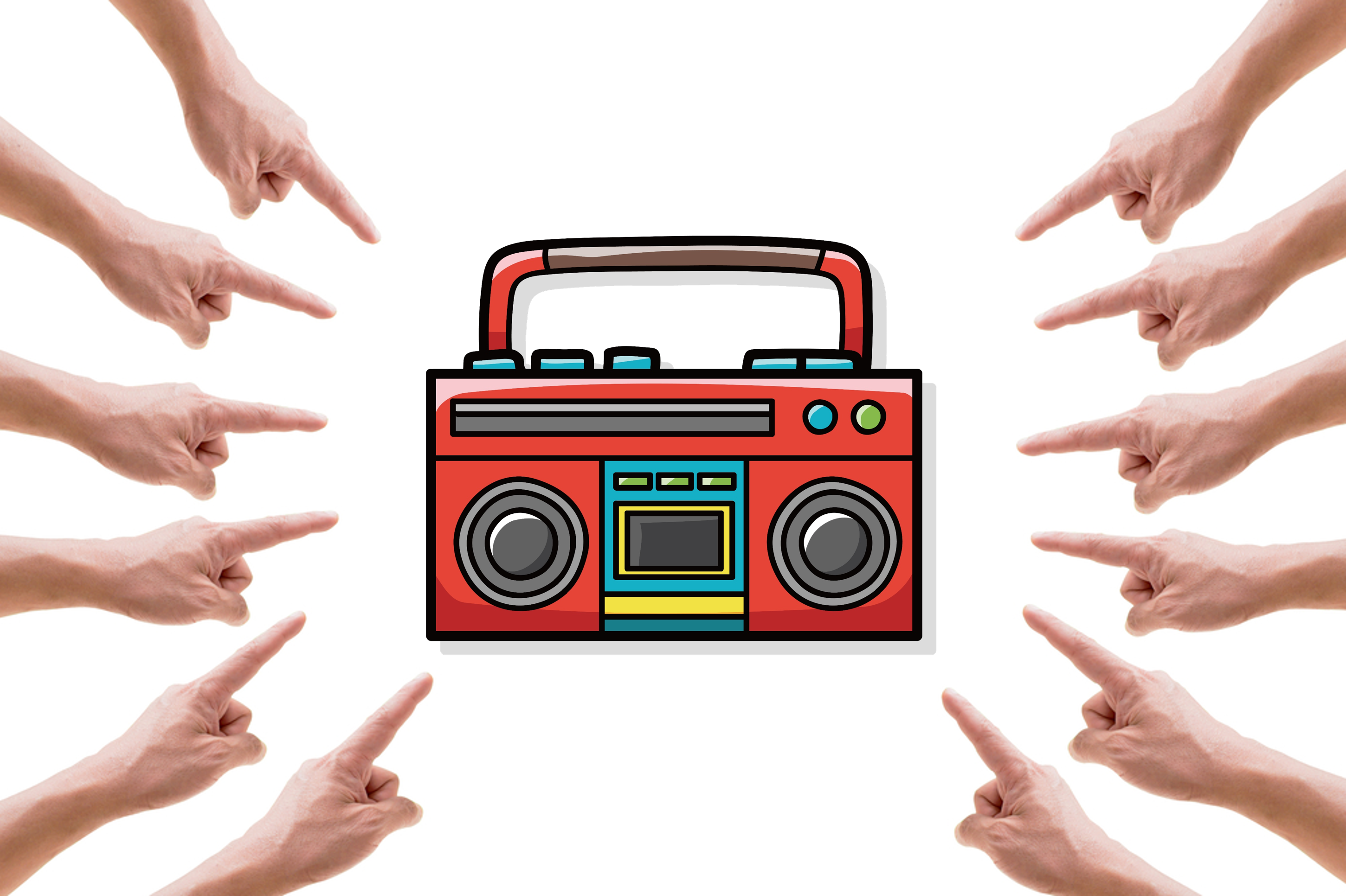
I recently read an article about new research suggesting that students who listen to music while they study tend to get higher grades. It caught my attention because as a kid growing up in Detroit, I often listened to radio while doing homework, much to my mother’s chagrin.
I guess you could say it worked out all right. The good news, of course, is that listening to WKNR and CKLW at night (and also WHAS, WLS, and others that “came in” at night) didn’t corrupt my life. But maybe the bad news is that I ended up going into radio as a career. So you decide.
A story in Study Finds explores the relationship behind studying with a musical soundtrack and scoring a higher GPA. A OnePoll sample of 2,000 Americans even pinpointed that Classical (31%), R&B (28%), Country (28%), and Rock (26%) were the most sonically and academically compatible.
I think one of the reasons why this new research caught my eye is that I remember seeing a study done decades ago suggesting the opposite. And like so much of the data we get to slice and dice, the findings often contradict themselves.
And then I ran across Paul Fairie’s popular Twitter account. He describes himself as an instructor at the University of Calgary, and someone whose Twitter account revolves around “politics, silly jokes, or curiosities from old newspapers.”
It’s this last category that’s so damn compelling. When you scroll through this guy’s feed, he has raised the “Blame Game” to an art form, finding “evidence” that virtually everything is “bad for you” – always in print.
But radio?
How could radio be a negative in people’s lives or in society?
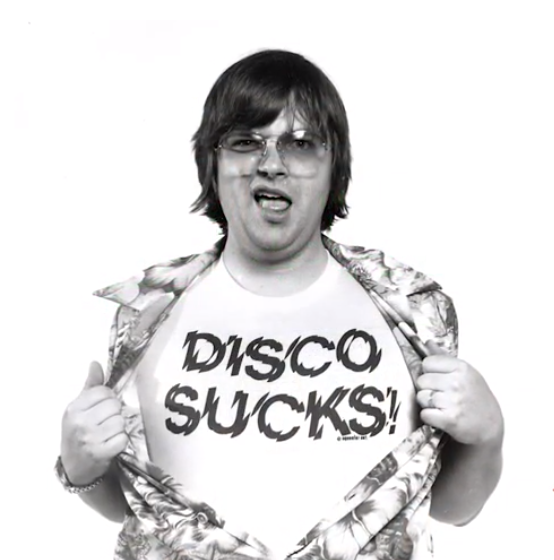 Well, for starters, you might remember Steve Dahl’s “Disco Demolition” at Comiskey Park in Chicago back in 1979 that ended up forcing the White Sox to forfeit the second game of a doubleheader (against my Detroit Tigers).
Well, for starters, you might remember Steve Dahl’s “Disco Demolition” at Comiskey Park in Chicago back in 1979 that ended up forcing the White Sox to forfeit the second game of a doubleheader (against my Detroit Tigers).
Or you might make the case that certain radio personalities – from Howard Stern to Alex Jones to the Greaseman to Sean Hannity have done some damage along the way. Of course, they’ve entertained millions.
JacoBLOG readers might recall a post I wrote back in 2016 – “We Must Do Something About Distracted Driving.” It catalogued some of the accusations local governments and other critics attempted to make, suggesting car radios were harmful to drivers, and by extension, passengers.
But Fairie’s tweets make that finger pointing child’s play. In his string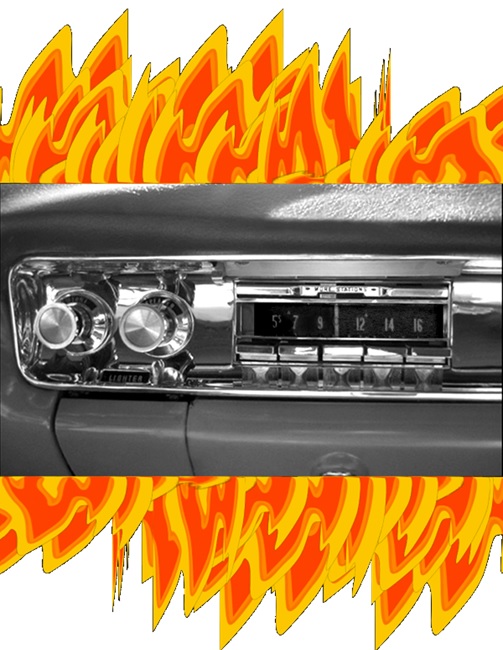 of old newspaper stories, he’s tapped into a goldmine of “hair on fire” reasons why radio has been harmful to all sorts of people, wildlife, and institutions most of us could not possibly fathom. Except perhaps for maybe Tom Leykis.
of old newspaper stories, he’s tapped into a goldmine of “hair on fire” reasons why radio has been harmful to all sorts of people, wildlife, and institutions most of us could not possibly fathom. Except perhaps for maybe Tom Leykis.
“A List of Things People Blamed on Radio” is a fantastic thread that will surprise and amaze.
Some of them are remarkably dumb, others are head scratchers, while you might find a couple just crazy enough to be plausible. (Kidding….I think.)
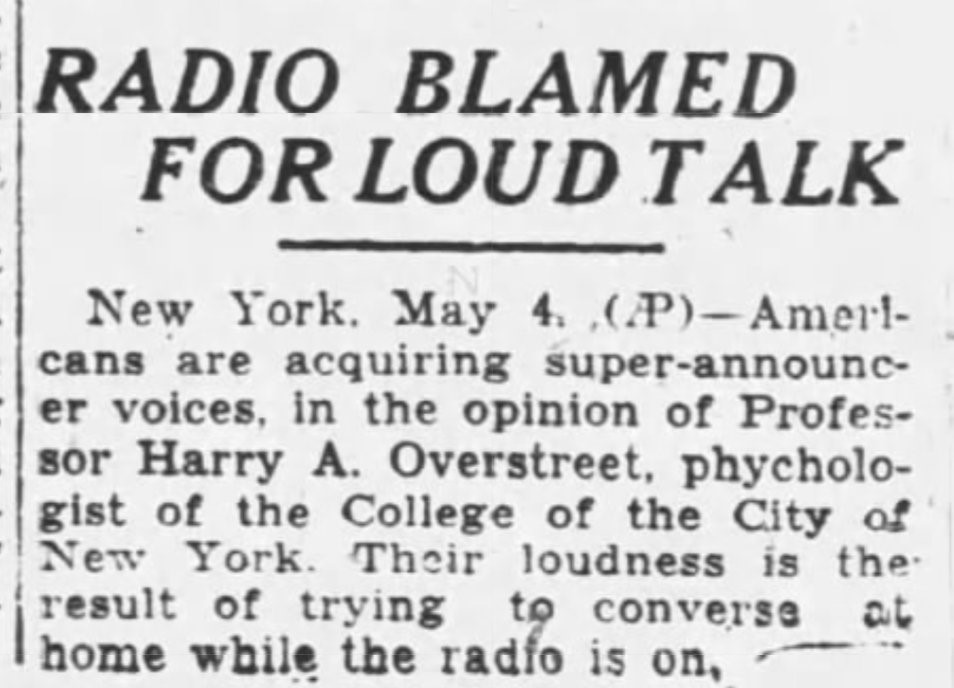 For starters, Fairie chronicles the accusation that radio is the catalyst for that scourge of “loud talk” in the U.S. (I had always suspected this.)
For starters, Fairie chronicles the accusation that radio is the catalyst for that scourge of “loud talk” in the U.S. (I had always suspected this.)
The story alleges that Americans may be becoming a race of “super-announcers,” raising their voices in order to be heard over the growing number of radios in people’s homes.
(By the way, if you’re a “super-announcer,” please send me an aircheck.)
Nearly 100 years ago, the fledging radio medium was getting the brunt of the blame for drought.
This story tells of a business implored by President Hoover to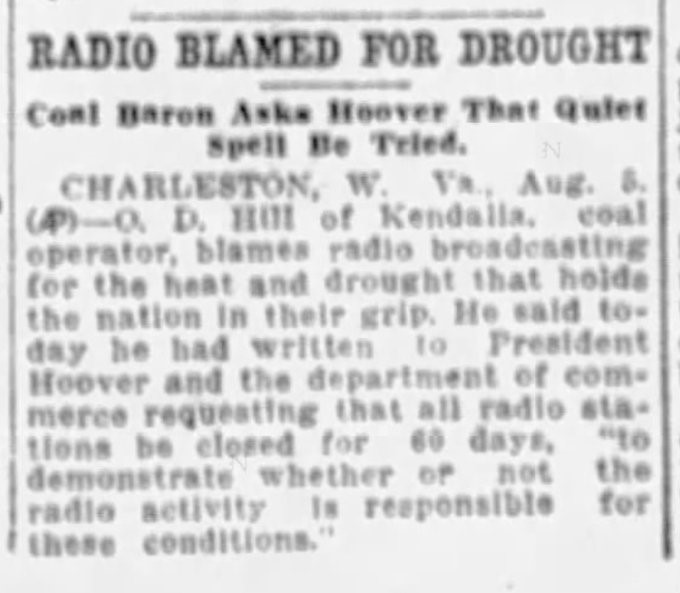 designate a radio hiatus of 60 days (that’s two-thirds of a rating book!) as a possible remedy for a long period of heat and drought in America.
designate a radio hiatus of 60 days (that’s two-thirds of a rating book!) as a possible remedy for a long period of heat and drought in America.
Mr. O.D. Hill apparently hatched this scheme as a way to prove once-and-for-all whether radio broadcasting was the cause of these torrid conditions.
The plan was to request “all radio stations” shut down during this test period. (One could only imagine how Bob Pittman or David Field might have reacted to this plea.)
Of course, just when you start to believe in this stuff, someone comes along to refute it. Or make the opposite claim.
Over in Matlock, England, a community uprising cropped up, instigated by “many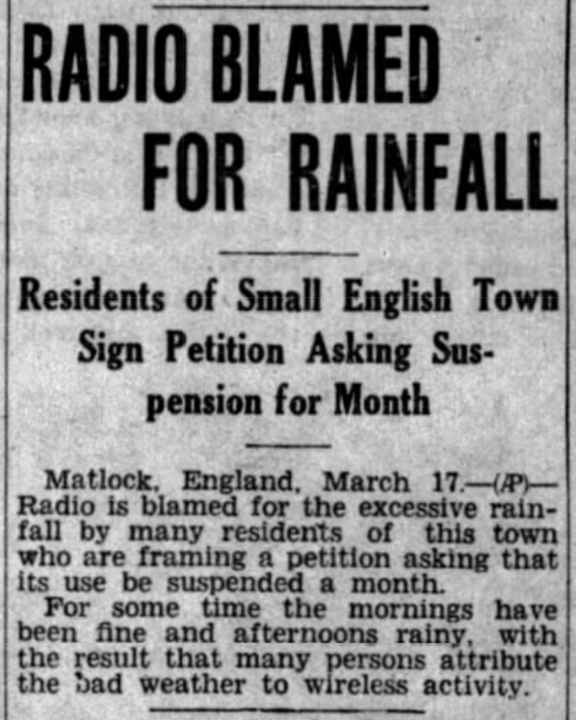 residents” who became convinced that radio might be the cause of the area’s excessive rainfall.
residents” who became convinced that radio might be the cause of the area’s excessive rainfall.
Reading deeper into this story reveals dayparting may have indeed been the culprit as the morning hours had been apparently normal, while the afternoon hours were overly wet.
The latest update to this story indicated a petition going around, asking radio operators to suspend their broadcasts for a month to test the waters. Again, no comment from the local radio CEOs.
Radio has long been accused of being harmful to our fine feathered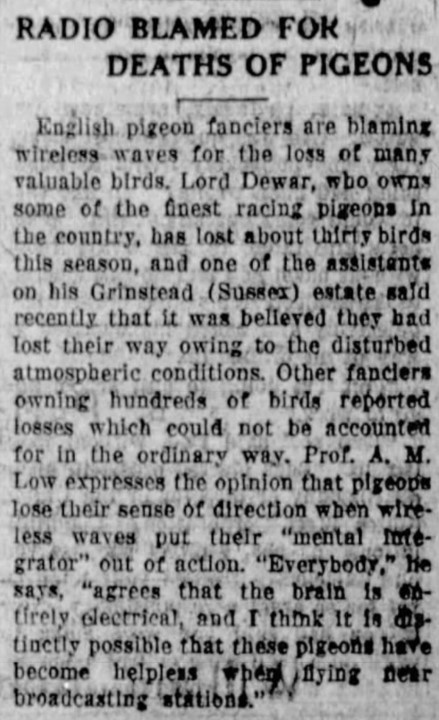 friends. Once again in England, pigeon lovers were pointing their collective fingers at radio waves, allegedly confusing the birds and causing them to lose their way.
friends. Once again in England, pigeon lovers were pointing their collective fingers at radio waves, allegedly confusing the birds and causing them to lose their way.
And ultimately their lives.
Lord Dewar was the royal beyond this crusade, with help of an academic, Professor A.M. Low.
It is not known whether these influential locals asked for a radio moratorium like the others.
Paul Fairie’s list of radio being a scapegoat goes on and on.
Obviously, playing the “Blame Game” has been something societies have been doing for centuries. And it’s always easy to blame the new kid – i.e., cutting edged technology for things we cannot readily understand.
Whether it’s social media, smartphones, AI, 5G, or Alexa, people are quick to point fingers. Even when we have research, it is not difficult to find studies that contradict one another.
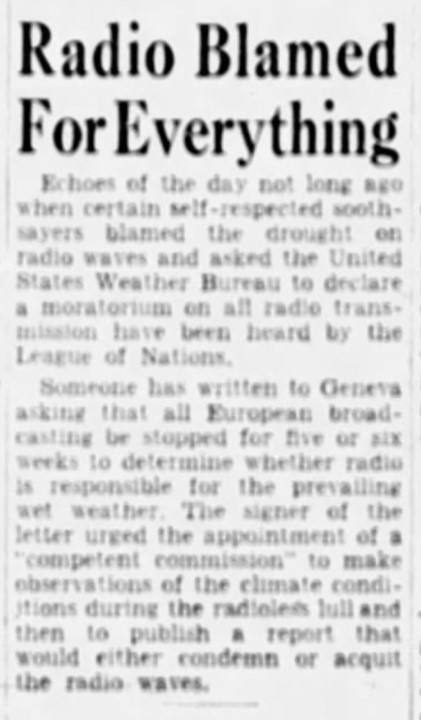 So, this headline sums it up for me – let’s blame radio for EVERYTHING.
So, this headline sums it up for me – let’s blame radio for EVERYTHING.
(At least the headline writers back then had a sense of humor.)
Ironically, the League of Nations (the U.N.’s predecessor) plays a role in this story that originates from Geneva, a neutral enough place. Again, the idea is more “radio silence” – another moratorium proposed to be 5-6 weeks long – that might once and for all help scientists determine the degree of blame radio deserved for all that was wrong with early 20th century life.
And remember those contradictions. This blog post showcasing Paul Fairie’s “blame radio” headlines may seem very dated to our digital natives reading this blog post.
But the fact is, that with all our experience, our science, and our research, we are often right back at Square One.
The final panic headline from Professor Fairie’s collection illustrates the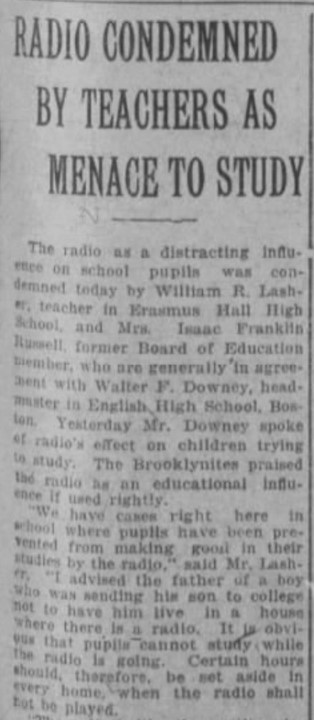 paradox. This post started with a story about the benefits of listening to music (and by extension, radio?) while studying.
paradox. This post started with a story about the benefits of listening to music (and by extension, radio?) while studying.
But a 100 or so years ago, a debate broke out in Brooklyn, NY at the once esteemed Erasmus Hall High School first established in 1905.
As the blaring headline strongly makes the academic accusation, radio just might be the root cause of studying distraction.
Even back then, academics knew radio was a powerful tool. When abused, it could even impede the road to higher learning.
Back in Brooklyn, no broadcasting moratoriums were suggested. But some thought the idea of designating certain times each day as “non-radio hours” might be just the idea.
Paul Fairie has put together an important reminder of just how fearful our forefathers and mothers were of a medium that has somehow stood the test of time.
And if radio could overcome all these pointed accusations, it ought to be able to survive streaming, podcasting, and satellite delivered content.
As for the pigeons, that may be another thing entirely.
Postscript: The famed Erasmus Hall High School is still in Brooklyn but closed for good in 1994. The reason? Poor academic scores. The investigation is still ongoing. – FJ
- In Radio, You Just Never Know - April 17, 2025
- The Secret To Making A Great Podcast (And Great Radio) - April 16, 2025
- I Read The (Local) News Today, Oh Boy! - April 15, 2025




So does the article specifically answer the long posed question, which is more important to radio, sales or programming? 🙂
Well the good news, the Tigers didn’t lose that game! But hasn’t every generation had their “thing” that would ruin civilization as we know it?
I think so, Jerry. And it was typically the new technology.
You’ll laugh at this, I hope, FRED.
(There, got it right this time, without help from the late Gerry Rafferty.)
Reading this article, a song from the musical “West Side Story” — the movie of which from 1961 is still one of the all-time classics, IMHO — popped into my mind.
“Dear Officer Krupke” … except substitute “Dear Radio Station” … the rest of it all works.
♫♫ Goodness gracious, that’s why I’m a mess! ♫♫
Good one, K.M. The lyrics came right back to me.
You’ll get no static, no static, no static at all from me, Fred…but then I’m radio gaga.
🙂
I have unsuscribed. There´s no justification to defend Alex Jones, even slightly, even if he has “entertained millions”. Jones hasn’t done “some harm”: he has been spreading damaging lies and has hurt the families of massacre victims. Goodbye.